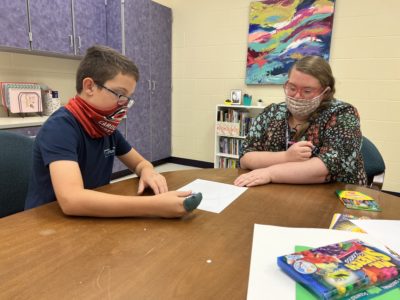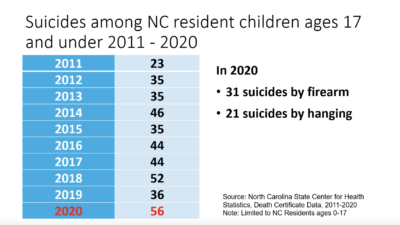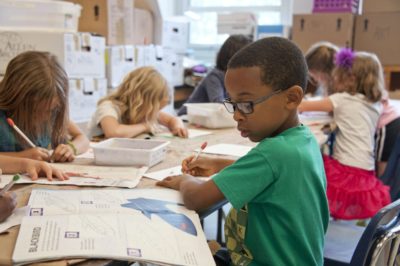
As we approach the two-year mark of disruptions to schooling caused by the pandemic, we continue to encounter challenges that are testing families, educators, and schools. Many of us — including our children — are already exhausted, wondering “How are we going to get through another year?”
In addition to concerns about physical health during the pandemic, a U.S. Surgeon General Advisory has called attention to ongoing mental health concerns in youth. Children and teens have shown increased levels of psychological distress. Rates of hospitalization for suicide-related crises have increased, especially among girls.
The Surgeon General calls on schools to enhance mental health care for students and families. But research also suggests that when schools and families partner to support children and teens together, students benefit.
I research suicide prevention, with a focus on the role schools can play in supporting students with mental health concerns. I’m also a mother. From those perspectives I offer some suggestions for educators and families for partnering to support student mental health — in a pandemic.
Risk for suicide is complex. It is driven by multiple, intersecting environmental, biological, and psychological factors, that differ across individuals. Identifying protective factors against suicide is not like identifying a cure. Rather, a more realistic approach is to identify one hopeful piece of a complicated puzzle.
One of those hopeful pieces of the puzzle? Teachers.
Teachers play countless roles in supporting the healthy development of our children. When students feel connected to their schools, by way of teachers and peers, they are approximately half as likely to report thoughts of suicide or to make a suicide attempt. They also appear less likely to make a suicide attempt in the months following an emergency room visit. And, positive student-teacher relationships can help support student recovery following a suicide-related crisis.
But teachers and other school professionals are struggling, too. They need our help.
As most schools across the U.S. opened for in-person instruction this past fall, there was an increase in school shooting threats and aggressive attacks on their work. Teachers report multiple stressors after delivering remote learning for many months and greater mental health concerns compared to those in other professions. Instead of thanking our teachers for facing these issues, they have been facing an onslaught of threats.
But still, teachers push on.
Day-in and day-out, teachers provide safe, caring places for our children, teaching them skills for success. These actions are an important piece of the puzzle, contributing to prevention of suicide-related risk. They also help our children build other critical social, emotional, and academic skills.
When educators and families work together, these effects may be even greater. Here are five suggestions for educators and families to strengthen these partnerships:
Communicate about student needs and supports
Educators and families have expert insight into the day-to-day experiences of students that can inform identification of suicide-related risk, as well as the need for additional supports. Together, educators and families can help link students to evidence-based treatments addressing suicide-related risk.
Communicate about positive experiences, student strengths, and personal joys
Focus on positives and strengths. Strengths-based conversations can help build a holistic understanding of students and may help facilitate problem-solving as later issues arise.
Review school procedures and policies
This can help children learn and follow school rules such as those around mask wearing and physical distancing. When families and educators disagree with school district policies, model approaches to advocacy that remain respectful to the school community so students can maintain meaningful and positive connections.
Give one another grace
Increased distress has been documented among educators, parents, and students since the start of the pandemic, underscoring the importance of considering each other’s unique circumstances.
Express gratitude for one another
By modeling gratitude, educators and families may also help teach students to be grateful, which can reinforce their connectedness to their home, school, and community. Make it a point to simply say, “Thank you.”
And, of course, it’s not just teachers supporting our students, but an entire community of administrators, support staff, community members, and care providers. We can extend our gratitude to them all for helping our students thrive.
So let’s get together to support our students.
As a researcher, and also, as a mom, I can get us started. Thank you.
Warning signs
The American Foundation for Suicide Prevention offers these suicide warning signs and guidance:
– Talking about wanting to die
– Looking for a way to kill oneself
– Talking about feeling hopeless or having no purpose
– Talking about feeling trapped or in unbearable pain
– Talking about being a burden to others
– Increasing the use of alcohol or drugs
– Acting anxious, agitated or recklessly
– Sleeping too little or too much
– Withdrawing or feeling isolated
– Showing rage or talking about seeking revenge
– Displaying extreme mood swings
The more of these signs a person shows, the greater the risk. Warning signs are associated with suicide but may not be what causes a suicide.
If someone you know exhibits warning signs of suicide:
– Do not leave the person alone
– Remove any firearms, alcohol, drugs or sharp objects that could be used in a suicide attempt
– Call the U.S. National Suicide Prevention Lifeline at 800-273-TALK (8255)
– Take the person to an emergency room or seek help from a medical or mental health professional
If you are having thoughts of suicide, call the National Suicide Prevention Lifeline at 1-800-273-8255 (TALK). You can find a list of additional resources at SpeakingOfSuicide.com/resources.
Recommended reading



